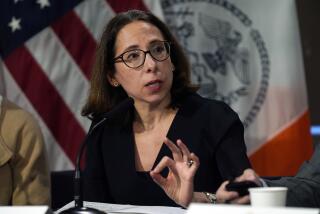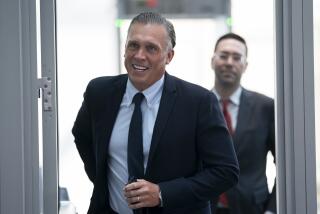Debate Heats Up Over SEC Chief’s Role in Enron Probe
- Share via
NEW YORK — Political pressure escalated Wednesday on Securities and Exchange Commission Chairman Harvey L. Pitt to disqualify himself from the SEC probe of Enron Corp. and its auditors, Andersen, because of Pitt’s prior role as a legal advocate for Andersen and other Big Five accounting firms.
Pitt so far has deflected such calls, saying that as chairman, he does not manage investigations, and he intends to follow all the legal and ethical requirements of his post.
“Talk about recusals misperceives how this agency operates,” he said in a statement Tuesday.
The SEC disclosed for the first time Wednesday that Pitt, along with Commissioner Laura S. Unger and then-Commissioner Isaac Hunt, participated in the commission’s unanimous Oct. 30 vote to open a formal investigation of Enron, the Houston energy trader that collapsed last year.
Atty. Gen. John Ashcroft has recused himself from the Justice Department’s criminal probe of Enron, citing a conflict of interest. Ashcroft received $57,000 in contributions from Enron for his unsuccessful campaign for U.S. Senate from Missouri last year.
At least two U.S. senators, Byron L. Dorgan (D-N.D.) and Jon Corzine (D-N.J.), earlier asked Pitt to step back from the Andersen portion of the probe.
Pitt, a former partner in the New York law firm of Fried, Frank, Harris, Shriver & Jacobson, played a leading role in the accounting industry’s long and ultimately successful fight to head off proposed SEC rules that would have barred accounting firms from doing certain kinds of consulting work for companies whose books they audit.
Instead, the “auditor independence” rules that the SEC finally adopted last year call for greater disclosure of the dual roles that accounting firms play rather than strict limitations.
The issue is central to the debate over Enron’s collapse. Critics contend that Andersen may have been reluctant to aggressively pursue Enron’s dubious accounting practices because at the same time it was conducting its audit, it was performing lucrative consulting work for Enron.
Enron last year paid Andersen $25 million for its auditing but $27 million for non-auditing consulting work.
Arthur Levitt, Pitt’s predecessor as SEC chief and the main force behind the agency’s push for tougher auditor-independence rules, said in an interview Wednesday that during his tenure, he recused himself from several votes involving companies whose stock he owned or on whose boards he had served.
“I think every chairman has recused himself at some point,” Levitt said.
However, he agreed with Pitt that the chairman does not directly oversee investigations and that such a recusal would be “largely ceremonial.”
But Scott Harshbarger, president of political reform group Common Cause, said that Pitt’s previous work for Andersen gave “the appearance of a conflict of interest that will make it more difficult for him to serve as a neutral fact finder.” The organization on Wednesday called for Pitt to recuse himself.
The people who are calling for Pitt to remove himself from the Enron/Andersen probe have their eye on the wrong ball, Columbia University law professor John C. Coffee said last night.
“I have really no doubt there will be an independent, thorough and objective investigation of both Enron and Andersen,” Coffee said.
Far more significant is what happens in the future, Coffee said, noting that the SEC and the accounting industry are negotiating over a new oversight structure for the profession.
In fact, Pitt has scheduled a news conference today in Washington to discuss proposed reforms.
“This should be a source of concern to Congress,” Coffee said. “Any important structural reform--and I believe the industry needs it--should involve legislation” rather than just SEC rule-making.
More to Read
Inside the business of entertainment
The Wide Shot brings you news, analysis and insights on everything from streaming wars to production — and what it all means for the future.
You may occasionally receive promotional content from the Los Angeles Times.










